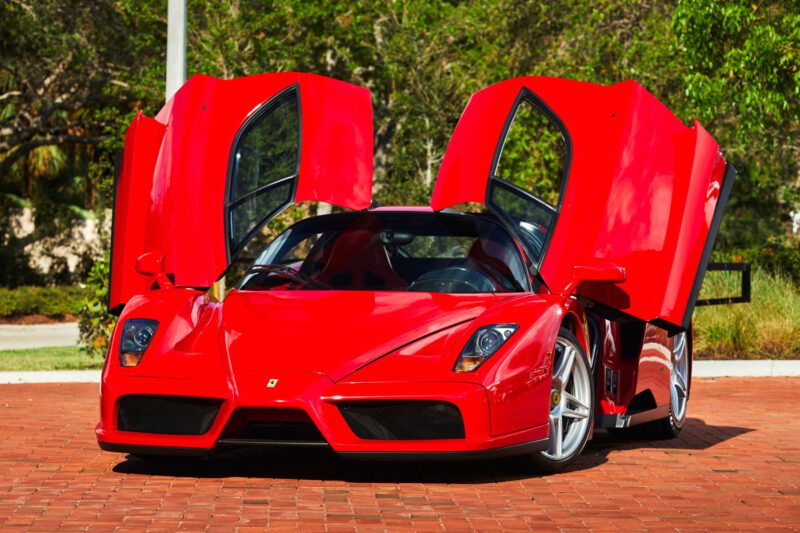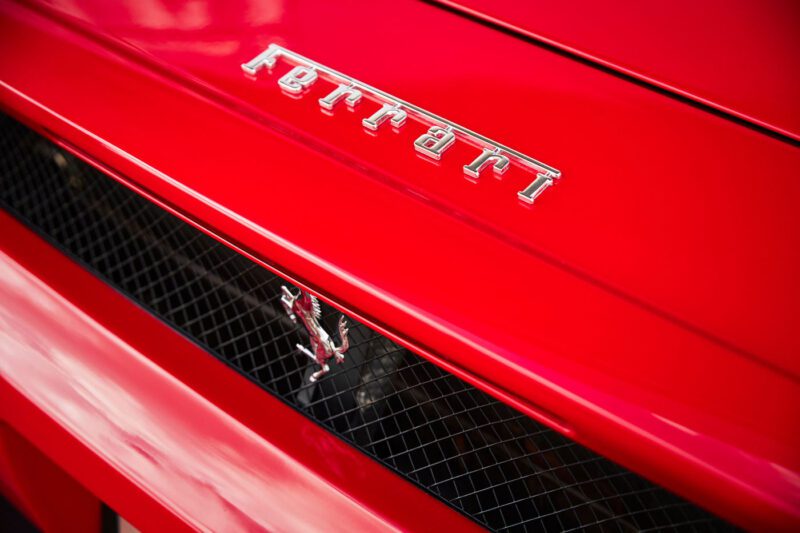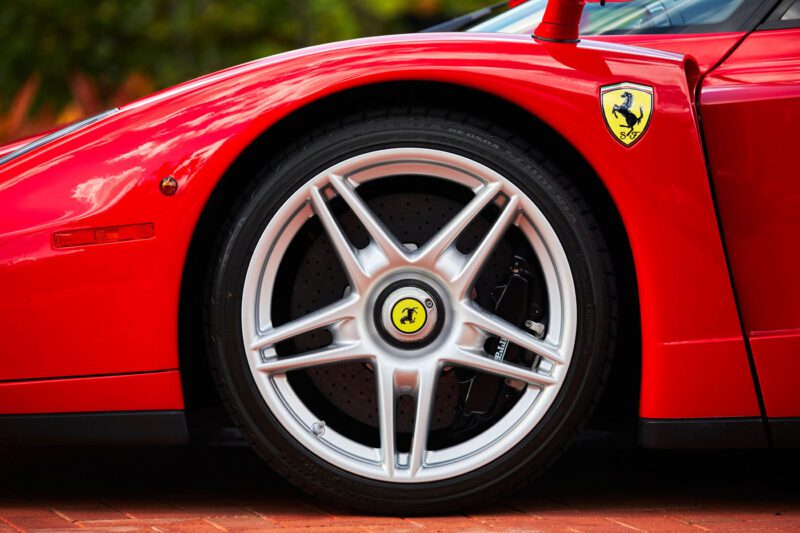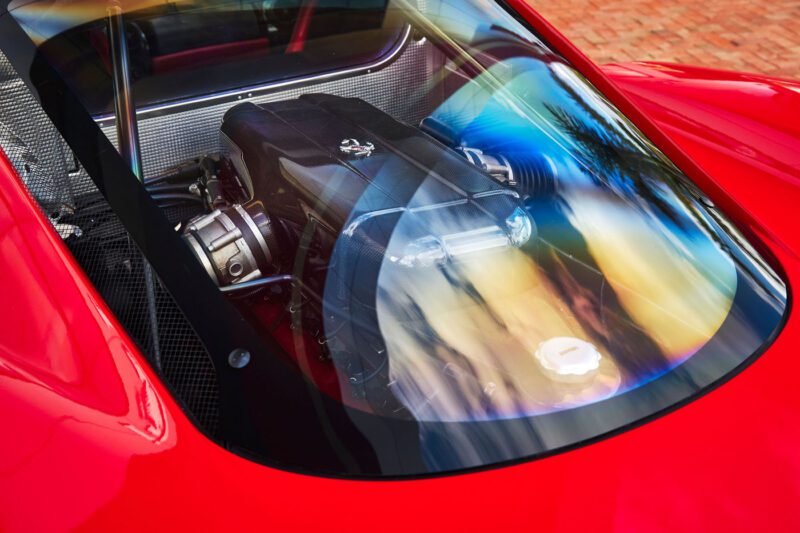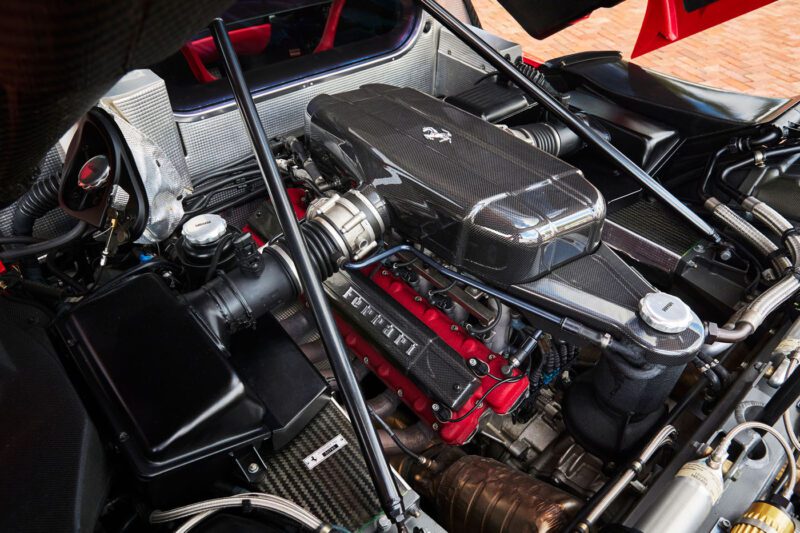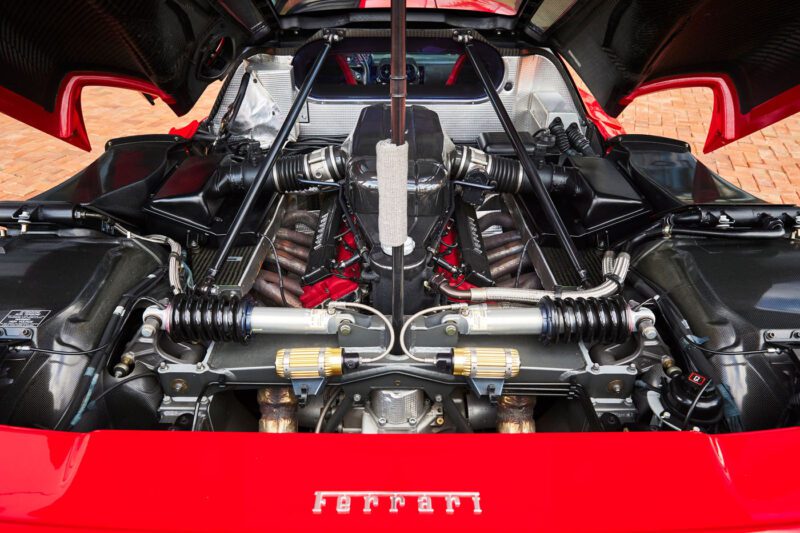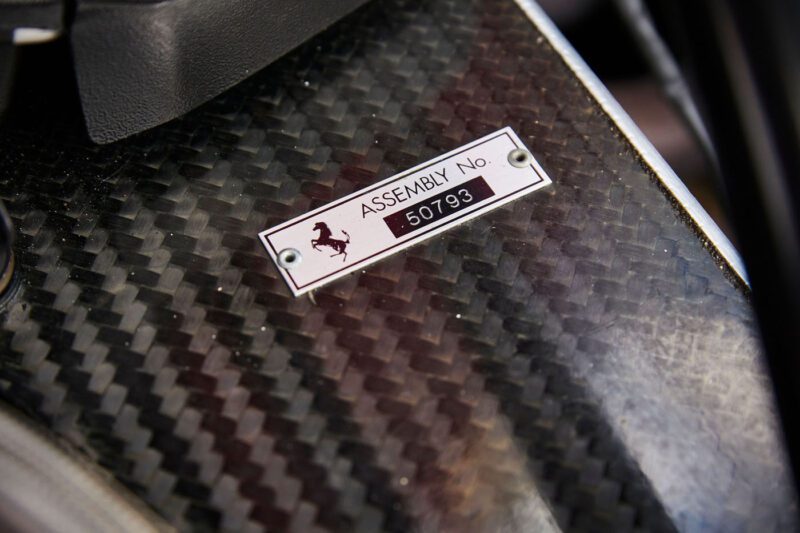RM Sotheby’s Miami: 2003 Ferrari Enzo
Presented by RM Sotheby’s.
If one manufacturer can claim to have created the definitive mold for a modern evolution of consistently amazing hypercars, it must be Ferrari. From the competition-bred 288 GTO and F40 of the late 1980s, through the voluptuous F50 of the 1990s, Ferrari combined unparalleled performance and breathtaking designs to build small batches of impeccable road machines for ultra-exclusive buyers. These were undeniably the most formidable production sports cars of their days.
After F50 production concluded in 1998, tifosi dreamt of what exotic machine Maranello would devise next—and what form it would take. Speculation was rampant over whether the next model would employ a rear-mounted V-8 or V-12, and if the packaging would be spartan and purposeful like the F40, or luxurious and evocative of vintage designs like the F50.
In mid-2002, Ferrari president Luca di Montezemolo ended the wait with the introduction of the forthcoming Ferrari Enzo. Though the model’s name required no explanation, he reasoned that after Ferrari had named cars for historically important locales like Maranello and Modena, the time had finally come to honor the company’s founder. He also clarified that the new model would have a strong connection to Formula 1 racing, as the manufacturer had just won the 1999 and 2000 Manufacturers’ Championship, and the 2000 Drivers’ Championship. Michael Schumacher was, in fact, just getting started on his historic dominance of F1, a still unequaled feat of five consecutive championships.
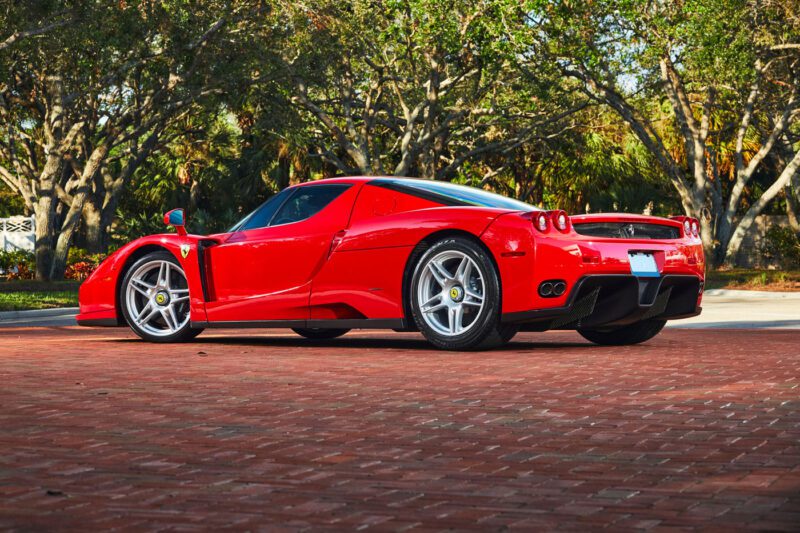
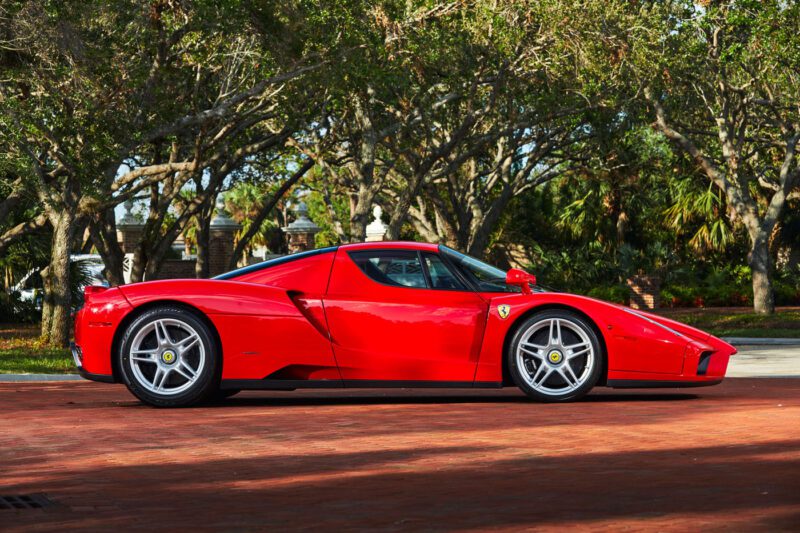
Formally debuting at the 2002 Paris Motor Show, the Ferrari Enzo certainly delivered on the premise of its design brief. Like a Formula 1 car, the Enzo utilized futuristic materials to achieve maximum weight savings, with a foundational chassis tub made of carbon fiber and Nomex honeycomb weighing just 200 pounds. Aluminum sub-frames were then mounted on the tub, and these laid the groundwork for the attachment of unique Pininfarina-designed coachwork.
Penned by designer Ken Okuyama during a lunch break, the Enzo’s external design mimicked the shape of an open-wheel race car, though as if wrapped in a skin extending over the fenders and cockpit. Aerodynamically perfected in Pininfarina’s wind tunnel, the body was comprised of panels woven from carbon fiber and Kevlar. Nineteen-inch alloy wheels anchored by 15-inch Brembo carbon-ceramic disc brakes, and unique scissor doors, respectively, completed the Enzo’s chassis and cabin, finishing a car that was highly technological and endlessly fascinating.
Into this phenomenal marriage of chassis and body, a new purpose-built engine was placed behind the driver, continuing the manufacturer’s long-running configuration for sports prototypes and hypercars. The concurrent 90-degree V-8 was essentially extended by two cylinders on each side and altered in angle, creating the 65-degree Tipo F140B V-12 engine. Displacing almost six liters, the F140 was the largest engine built by Maranello since the 712 Can-Am race car of the 1970s. It was packed with racing components such as Nikasil-lined cylinder walls, titanium connecting rods, and a telescoping intake manifold designed to boost torque, ultimately developing 651 horsepower and 485 pound-feet of torque, earth-shattering numbers even by today’s standards. The F140’s evolutions would go on to power the 599 series, the F12 Berlinetta, and LaFerrari.
With power transmitted via a six-speed dual-clutch transaxle that was actuated with column-mounted paddle-shifters, the Enzo reached 60 mph from standstill in just 3.3 seconds and a top speed of 218 mph. Production was initially proposed to be capped at 400 units, though customer demand eventually prompted the build of 498 cars, still ensuring the model’s exquisite engineering was commensurately matched by its rarity. As unique and captivating today as it was in 2002, the Ferrari Enzo continues to hold sway with collectors and supercar enthusiasts, unmistakably carrying the mantle of Maranello’s defining millennial hypercar while serving as the genetic link between the sensuous F50 and the hybrid-powered LaFerrari.
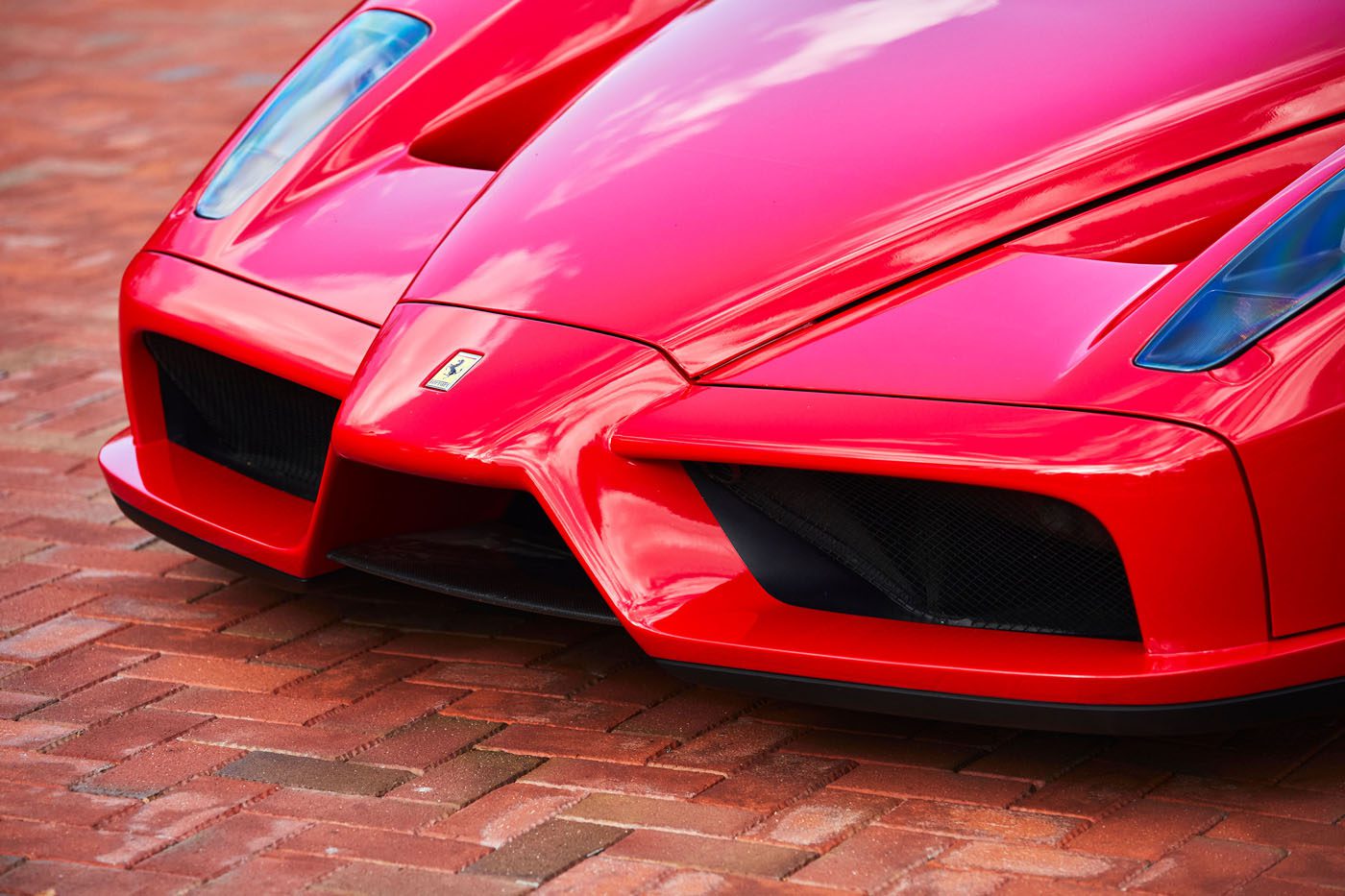
Mildly used and fastidiously maintained during a short ownership chain, this exceptional Enzo is a beautifully presented example of Maranello’s legendary hypercar. According to research on file, including that of marque expert Marcel Massini, as well as Ferrari Classiche certification, chassis number 133916 began assembly in June 2003, specified for delivery to the United States. Completing assembly in October 2003, the Ferrari was finished in the desirable color combination of Rosso Corsa paint over an interior of Rosso leather seats with matching door and dash panel trim. The interior is handsomely offset with Nero surfacing and carpets.
In November 2003 the US-specification Enzo was reportedly sold new through São Paolo, Brazil, dealer Via Europa Ltda, and by July 2004 the car was titled in Beverly Hills, California, with initial ownership by an enthusiast residing in the Golden State. The hypercar was then presented in August 2004 at the Concorso Italiano staged in Seaside, California.
By October 2004 the Ferrari was purchased by a collector based in Glen Cove, New York, and the car was serviced several times over the next few years by the authorized marque dealership Ferrari of Long Island. In January 2008 the Enzo was spotted in attendance at the Palm Beach Cavallino Classic, enjoying the discriminating company of many other high-quality flagship Ferraris. After 10 years the Long Island-based owner decided to sell the Ferrari, and the car was acquired circa August 2014 by its third owner, an enthusiast living in South Carolina.
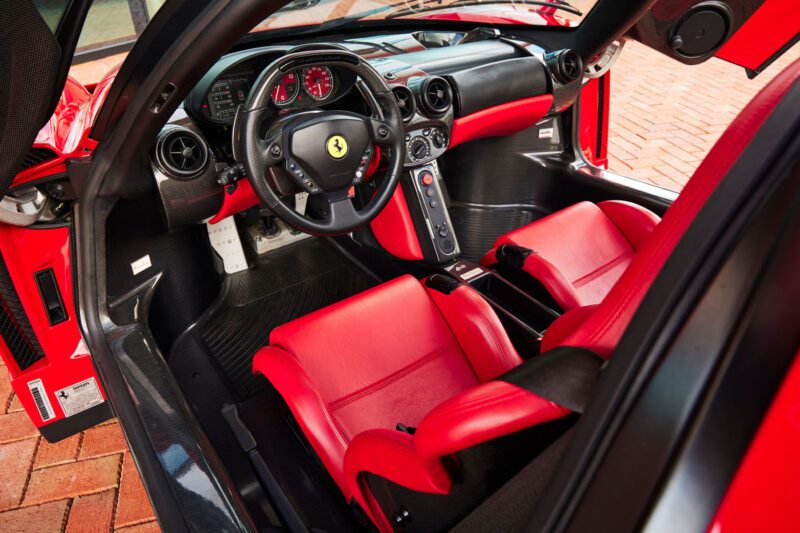
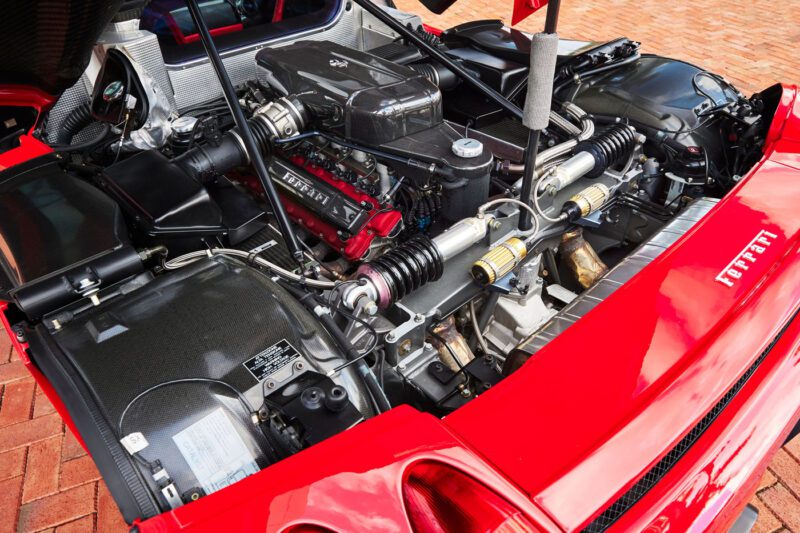
The Enzo continued to enjoy regular attention by marque dealerships, including service in May 2017 by the respected Foreign Cars Italia in Greensboro, North Carolina. It is significant to note that in 2020, Ferrari Classiche certified that this car retained its matching-numbers chassis, engine, gearbox, and coachwork. However, the original Red Book has been lost, and the consignor has ordered a replacement through Ferrari that will be made available to the buyer.
The Ferrari was more recently acquired by the consignor, a Florida-based collector of modern hypercars who is believed to be the car’s fourth owner. Serviced in March 2022 by Ferrari of Fort Lauderdale, including the installation of a new battery and mounting of new Bridgestone Potenza tires, the Enzo continues to display the benefits of regular attention by marque specialists, and it displayed 11,870 miles at the time of cataloguing, reflecting a life of gentle care and modest driving use.
Resplendent in the popular color combination of Rosso Corsa over Rosso/Nero, chassis number 133916 offers great rarity, as it is one of just 111 cars specified for the US market, and one of 498 total examples built. Bearing all the hallmarks of the model’s superlative qualities, including advanced Formula 1-inspired engineering, aerodynamically perfected coachwork design by Pininfarina, and truly visceral performance, this beautiful Enzo would make a fantastic addition to any sporting collection. It is ideal for any marque enthusiast, particularly those collectors seeking to complete their galleries of Ferrari’s legendary modern “Big Five” hypercars.
This vehicle will be offered at RM Sotheby’s Miami sale, taking place 10 December. View more and register to bid online at rmsothebys.com today.
